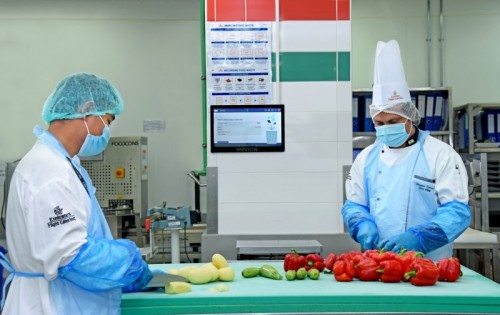Emirates Flight Catering Leverages AI Technology To Reduce Food Waste By 35%

This World Food Day, Emirates Flight Catering (EKFC), one of the world’s largest airline catering providers, announced that it has committed to reducing food waste by 35% across its central operations in Dubai.
To reach its ambitious goal, EKFC has engaged Winnow to gradually roll out an advanced food waste management system in its state-of-the-art catering facilities. Leveraging artificial intelligence (AI) and machine learning, the tool will enable EKFC to automatically monitor and control food waste for the benefit of its customers, its people and broader communities.
Saeed Mohammed, CEO of Emirates Flight Catering, said: “We are dedicated to investing in the latest technologies to optimise our operations and minimise our environmental footprint. Food waste management has always been an area of focus for EKFC and we have already achieved remarkable results through improved data collection and reporting.
“Implementing new ways of working, supported by technology will help us step up to the next level and further enhance operational efficiency. We look forward to delivering on our ambitious goal of reducing food waste by more than one-third across our central operations.”
Marc Zornes, CEO and co-founder of Winnow, said: “We are delighted to partner with Emirates Flight Catering helping them in their quest to cut their food waste by 35%. Food waste is a global problem that we must solve urgently to combat the effects of climate change. Artificial Intelligence has an important role to play in reducing avoidable wastage, and forward-thinking foodservice providers like Emirates Flight Catering prove that this technology delivers real world results for both people and planet.”
Around one-third of all food grown in the world goes to waste and landfill. EKFC is committed to reducing that and has taken various initiatives to make a difference. In an effort to use the whole product, in the financial year 2019-20 close to 500 kilogrammes of food items, including fruits, vegetables, bakery items and meat, were saved each day to be used in small goods, or were reused for different purposes in the company’s retail operations. EKFC has also been working closely with many of its airline customers to analyse consumption trends and use predictive data to optimise the loading of F&B for in-flight catering. Analysis of on-board data not only reduces waste but also fuel burn associated with carrying excess weight.
The new AI-enabled food waste management system will enable EKFC to significantly improve reporting and data collection to further reduce food waste. Using a camera, a set of smart scales and the same type of machine learning technology found in autonomous vehicles, the advanced system ‘learns’ to recognise different foods being thrown in the bin and calculates the financial and environment cost of this discarded food to the kitchens. EKFC will adjust its food purchasing decisions accordingly.
During the training and automation phases, the Winnow Vision system takes human input, providing a shortlist of possible menu items for kitchen staff to select and to quickly improve its predictions based on feedback. Over time, the system continues to improve and will automatically recognise food with no human interaction.
Food waste is a topic of increased focus in the UAE and around the world. The National Food Waste Pledge, an initiative led by the Ministry Of Climate Change And Environment (MOCCAE) convened hospitality leaders across the UAE to prevent 3 million meals a year from being wasted by the end of 2020. As well as EKFC, other signatories include Majid Al Futtaim, Hilton, Marriott, IHG, Jumeirah and Emaar Hospitality.
Emirates Flight Catering is one of the world’s largest catering operations. Offering airline, events and VIP catering as well as ancillary services including laundry, food production and airport lounge food & beverage, Emirates Flight Catering is a trusted partner of over 100 airline customers, hospitality groups and UAE government entities. In the financial year 2019-20, the company’s 11,000 dedicated employees prepared over 80 million meals and handled 77,000 tonnes of laundry.


